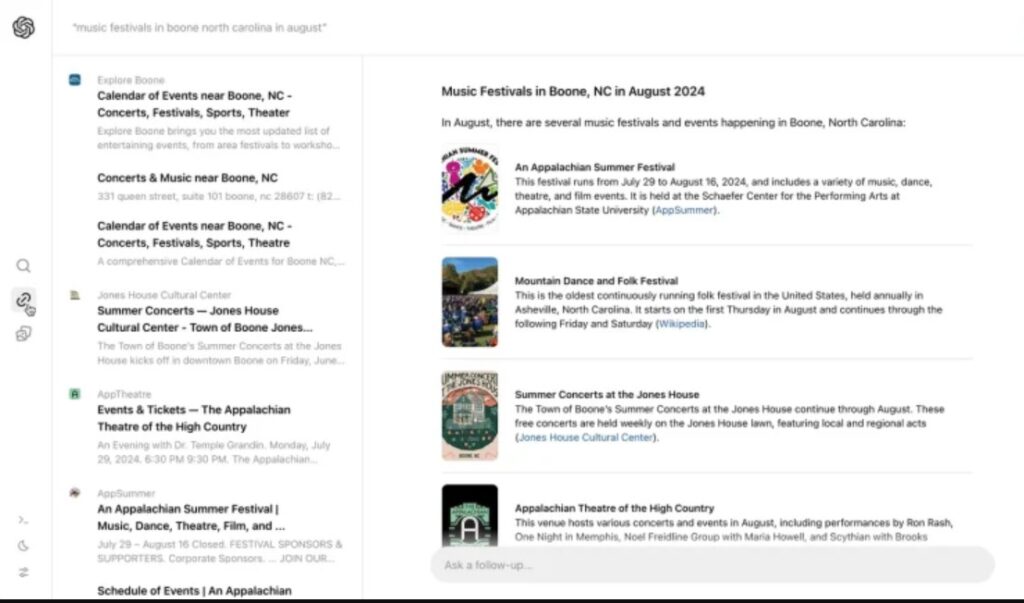Hold onto your keyboards, folks, because the search engine game just got a whole lot more interesting. OpenAI, the tech wizards behind ChatGPT, have just dropped a bombshell in the world of web search. Enter SearchGPT, their shiny new AI-powered search engine that’s got Silicon Valley buzzing. OpenAI has launched SearchGPT, a new AI-powered search engine. This marks OpenAI’s entry into the search market, competing with Google and AI search tools like Perplexity.
SearchGPT builds on the success of OpenAI’s ChatGPT language model. This launch comes as interest in AI-enhanced search capabilities grows, with many tech companies integrating AI into search systems.

What is SearchGPT?
This is a prototype search engine that uses OpenAI’s language models for an intuitive search experience. Unlike traditional search engines that list links, GPT organizes and summarizes web information.
Key features of SearchGPT:
- A large text box asking, “What are you looking for?”
- Summarized findings with short descriptions and attribution links
- Ability to ask follow-up questions
- Sidebar for accessing other relevant links
- A “visual answers” feature (details are limited)
OpenAI plans to integrate Search GPT’s features into ChatGPT eventually, but there is no specific timeline. The prototype is limited to 10,000 test users, and it is unclear when or if Search GPT will be available to the public. Read this also OpenAI Introduces ChatGPT Edu To Revolutionize Education June 2024

SearchGPT Technology Explained
SearchGPT is built on OpenAI’s GPT-4 models, known for their advanced language processing. It pulls real-time information from the web, addressing limitations of earlier AI models.
OpenAI partners with third-party providers and uses direct content feeds to create search results. Collaborations with news organizations like The Wall Street Journal, The Associated Press, and Vox Media help:
- Enhance search result accuracy
- Address copyright concerns
- Ensure fair content attribution
Publishers can control how their content appears in SearchGPT and can opt out of using their content for model training.
User Benefits of SearchGPT
SearchGPT offers several advantages for users:
- Streamlined Information Organization and Summarization SearchGPT doesn’t just list links; it organizes and summarizes information. For example, it summarizes findings about music festivals, providing brief descriptions and attribution links. This saves time by presenting key information upfront.
- Interactive Follow-Up Question Feature Users can ask follow-up questions after the initial results. This feature mimics a conversational approach, making complex research tasks easier and faster.
- Visual Answer Integration Though details are limited, SearchGPT includes a “visual answers” feature, potentially using AI-generated imagery. This could help users understand complex topics better through visual representations.
Challenges and Concerns
SearchGPT faces several obstacles:
- Legal and Copyright Challenges OpenAI has faced legal action over copyright violations in training its AI models. Their approach with SearchGPT, including partnerships and opt-out options for publishers, aims to address these concerns. The effectiveness of these measures is yet to be seen.
- Effect on Original Content Traffic If users get comprehensive information directly from search results, they might not visit source websites, potentially affecting advertising revenue for publishers.
- Competition with Established Search Engines Competing with established players like Google, which has significant resources and AI initiatives, is a challenge. SearchGPT must offer compelling advantages to attract users.
Generative AI in Search
Major tech companies are rapidly incorporating AI into their search products. Google launched AI Overviews, Microsoft integrated ChatGPT into Bing, and startups like Perplexity offer AI-first search experiences. This competition is driving rapid innovation.
AI-powered search engines might change how people access and consume information online. Instead of visiting multiple websites, users might rely on AI-generated summaries and answers. This could impact web traffic patterns and the digital economy.
As AI systems improve at summarizing and presenting information, there are concerns about users’ critical thinking skills and source evaluation. AI-powered search raises questions about biases in AI-generated summaries and transparency in these systems.
SearchGPT represents a significant development in search technology. As OpenAI refines and potentially expands this tool, its impact on user behavior, the publishing industry, and the digital landscape will be closely watched.
Conclusion:
As we’ve explored, SearchGPT isn’t just another player in the search engine arena – it’s a potential game-changer that could redefine how we interact with the vast ocean of information on the web. By leveraging the power of advanced AI and natural language processing, OpenAI is pushing the boundaries of what’s possible in search technology.
While SearchGPT is still in its early stages, limited to a select group of test users, its potential impact on the search landscape is undeniable. From revolutionizing how we find and consume information to potentially reshaping SEO and digital marketing strategies, the ripple effects of this innovation could be far-reaching.
